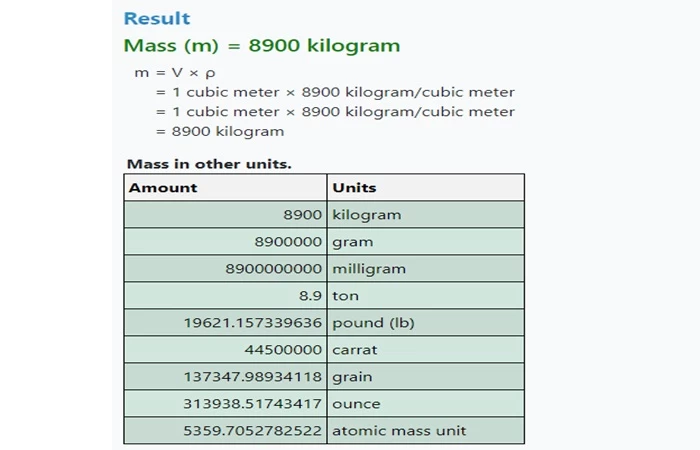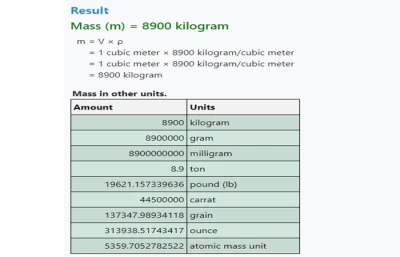Unlocking the World of Mass: Understanding, Calculating, and Applying in Diverse Fields
Learn how to calculate mass using density and volume, and discover the far-reaching applications across engineering, health, science, and more.

Mass:
Mass is a basic property of matter that quantifies the amount of substance in an object. It is a measure of the object's resistance to changes in motion. It is commonly measured in units such as kg or grams. In physics, there are two main types of mass: inertial mass, which relates to an object's resistance to changes in its state of motion, and gravitational mass, which determines the strength of the gravitational attraction between two objects. The equivalence principle in general relativity suggests that these two types of mass are equivalent. Mass is a conserved quantity, meaning it remains constant in a closed system, irrespective of physical or chemical changes within that system.
Mass calculator:
The mass calculator works to calculate the mass of an object and consists of the following three measures.
Density: Density is how much stuff (matter) is packed into a particular space. It is often measured in units like kilograms per cubic meter (kg/m³).
Volume: Volume is defined as the amount of space an object takes up. It can be measured in cubic meters (m³), cubic centimetres (cm³), litres, or any unit that measures three-dimensional space.
How to calculate the mass of an object?
Suppose you have a block of material with a density of 800 kg/m³ and a volume of 0.5 m³.
Mass = Volume x Density
Mass=800kg/m³×0.5m³ = 400kg
So, the mass of the block is 400 kilograms.

Applications of mass calculator:
- Engineering and Construction: Calculating the mass of building materials such as concrete, steel, or lumber is crucial for structural design and construction projects. Engineers use mass calculators to ensure that structures meet safety and regulatory standards.
- Manufacturing: In manufacturing processes, especially in industries like aerospace and automotive, knowing the mass of components is essential for designing and producing efficient and well-balanced products.
- Shipping and Logistics: Mass calculators are used in logistics to determine the weight of packages and goods for accurate shipping cost calculations. This is vital for both domestic and international shipping, where weight often directly influences shipping fees.
- Health and Fitness: In the health and fitness industry, mass calculators are used to determine body mass index (BMI) and body fat percentage. These metrics help individuals and healthcare professionals assess and monitor health and fitness levels.
- Chemistry and Pharmaceuticals: Chemists and researchers use mass calculations in chemical reactions and pharmaceutical formulations. Knowing the mass of reactants and products is crucial for determining reaction yields and ensuring accurate dosage in pharmaceuticals.
- Science: Environmental scientists use mass calculations to study pollution and waste. Determining the mass of pollutants in air, water, or soil helps assess environmental impact and design effective remediation strategies.
- Food Industry: In the food industry, mass calculations are used for portion control, nutritional labelling, and recipe scaling. This ensures that food products meet regulatory standards and that consumers receive accurate information about the products they consume.
- Mining and Geology: In mining and geology, mass calculations are essential for estimating the quantity of extracted minerals or resources. This information is crucial for planning mining operations and assessing resource reserves.
- Agriculture: Farmers and agricultural scientists use mass calculations to determine the amount of fertilizers, pesticides, and other inputs needed for crop management. This helps optimize resource use and minimize environmental impact.
- Research and Development: In various scientific research disciplines, mass calculations are fundamental for experiments and data analysis. Researchers use mass information to draw conclusions and make predictions in fields such as physics, chemistry, and biology. If you're interested in exploring additional calculators, check out CoolCalculator for a variety of useful tools.

Mass:
Mass is a basic property of matter that quantifies the amount of substance in an object. It is a measure of the object's resistance to changes in motion. It is commonly measured in units such as kg or grams. In physics, there are two main types of mass: inertial mass, which relates to an object's resistance to changes in its state of motion, and gravitational mass, which determines the strength of the gravitational attraction between two objects. The equivalence principle in general relativity suggests that these two types of mass are equivalent. Mass is a conserved quantity, meaning it remains constant in a closed system, irrespective of physical or chemical changes within that system.
Mass calculator:
The mass calculator works to calculate the mass of an object and consists of the following three measures.
Density: Density is how much stuff (matter) is packed into a particular space. It is often measured in units like kilograms per cubic meter (kg/m³).
Volume: Volume is defined as the amount of space an object takes up. It can be measured in cubic meters (m³), cubic centimetres (cm³), litres, or any unit that measures three-dimensional space.
How to calculate the mass of an object?
Suppose you have a block of material with a density of 800 kg/m³ and a volume of 0.5 m³.
Mass = Volume x Density
Mass=800kg/m³×0.5m³ = 400kg
So, the mass of the block is 400 kilograms.

Applications of mass calculator:
- Engineering and Construction: Calculating the mass of building materials such as concrete, steel, or lumber is crucial for structural design and construction projects. Engineers use mass calculators to ensure that structures meet safety and regulatory standards.
- Manufacturing: In manufacturing processes, especially in industries like aerospace and automotive, knowing the mass of components is essential for designing and producing efficient and well-balanced products.
- Shipping and Logistics: Mass calculators are used in logistics to determine the weight of packages and goods for accurate shipping cost calculations. This is vital for both domestic and international shipping, where weight often directly influences shipping fees.
- Health and Fitness: In the health and fitness industry, mass calculators are used to determine body mass index (BMI) and body fat percentage. These metrics help individuals and healthcare professionals assess and monitor health and fitness levels.
- Chemistry and Pharmaceuticals: Chemists and researchers use mass calculations in chemical reactions and pharmaceutical formulations. Knowing the mass of reactants and products is crucial for determining reaction yields and ensuring accurate dosage in pharmaceuticals.
- Science: Environmental scientists use mass calculations to study pollution and waste. Determining the mass of pollutants in air, water, or soil helps assess environmental impact and design effective remediation strategies.
- Food Industry: In the food industry, mass calculations are used for portion control, nutritional labelling, and recipe scaling. This ensures that food products meet regulatory standards and that consumers receive accurate information about the products they consume.
- Mining and Geology: In mining and geology, mass calculations are essential for estimating the quantity of extracted minerals or resources. This information is crucial for planning mining operations and assessing resource reserves.
- Agriculture: Farmers and agricultural scientists use mass calculations to determine the amount of fertilizers, pesticides, and other inputs needed for crop management. This helps optimize resource use and minimize environmental impact.
- Research and Development: In various scientific research disciplines, mass calculations are fundamental for experiments and data analysis. Researchers use mass information to draw conclusions and make predictions in fields such as physics, chemistry, and biology. If you're interested in exploring additional calculators, check out CoolCalculator for a variety of useful tools.
Conversation
Latest Blogs
© Blog CoolCalculator, Explore CoolCalculator, your destination for the latest insights, tips, and updates on the world of online calculators. Stay informed and make your calculations smarter with our blog. ,
Designed
by Saad Media Team , Team Lead M.Rizwan Akhtar












